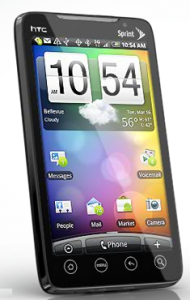First Impressions: HTC EVO running on Sprint's 4G network


During the event Sprint announced the pricing and availability of the phone ($200 with mail-in rebate, available June 4th), and also showed off the phone in action.
As I mentioned above, I was present and witnessed the demos first hand. While the presentation itself was a bit staged, not to mention that it enjoyed its share of glitches--the video chat demo didn't work, for example--it did properly represent what the phone has to offer. For example, instead of just mentioning that the phone sports an HDMI out, the presenters showed off a video playing from the device and onto a bunch of plasma screens at the event. They also showed YouTube HD playing on the device, and on those same plasmas. In addition to the video playback, the most notable features of the phone are that it's running Android, has a 4.3-inch display, 4G / 3G support, simultaneous voice and data in 4G markets, sports an 8 megapixel autofocus camera, which can also record 720p video, a front-facing 1.3 megapixel camera, and the phone can support up to 8 users as a portable hotspot. There are many other features including a built in kickstand, and you can read about them at now.sprint.com/evo.
The event also included demos of Google Street View, Layar, and some others, but the biggest thing I was waiting for was the video chat. In the case of the HTC EVO and Sprint's 4G network, the video chat is powered by Qik. I mentioned earlier that the demo failed, but I managed some alone time and captured an example of video chat in the video below. As you'll see, it's averaging about a half second delay currently, which isn't bad. Of course, there's hardly anyone on the network so it's not clear how it will really perform in everyday tests.
Overall the HTC EVO is a compelling offering. It includes the video conferencing abilities, HDMI out, a browser that can support Flash, hotspot functionality, and a whole lot more. Pricing isn't so terrible, though all-you-can-eat is going to run over $100 a month. The Snapdragon processor makes the UI fly, and even the demo of a game that I witnessed seemed to have no quality drop.
The big question I have about the HTC EVO is whether or not people will invest in a phone that's designed to deliver a premium experience on a network that's not completely rolled out yet. If the pricing is right, and the experience is compelling enough (it is!) then it should do alright. I do think that the lack of the 4G footprint is going to hurt adoption, at least initially.